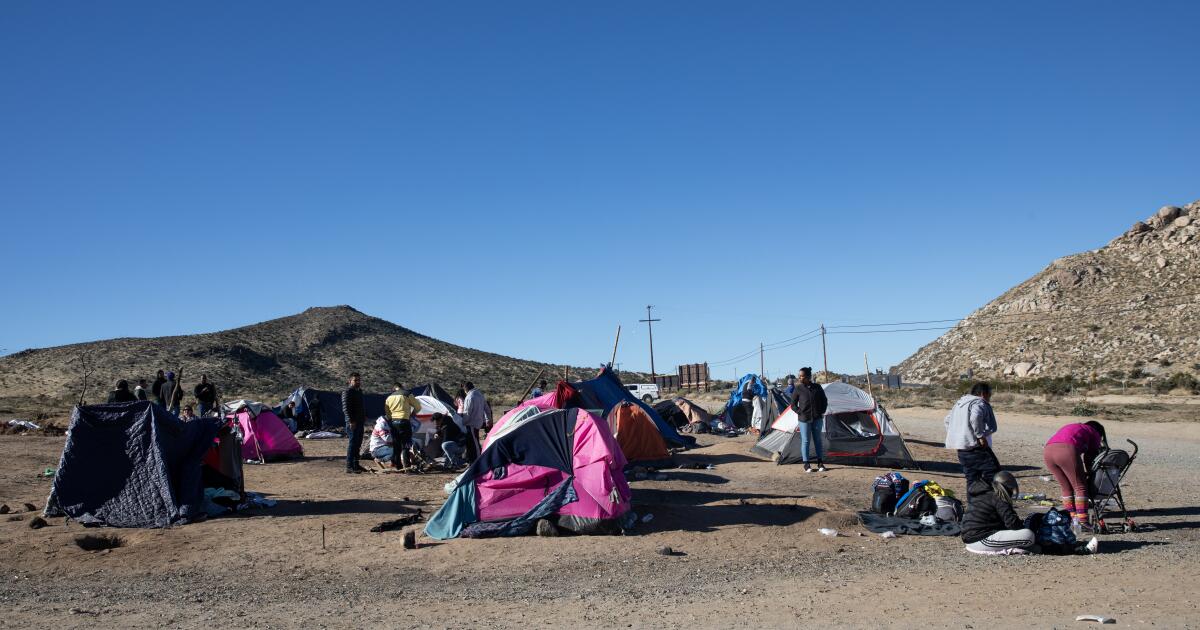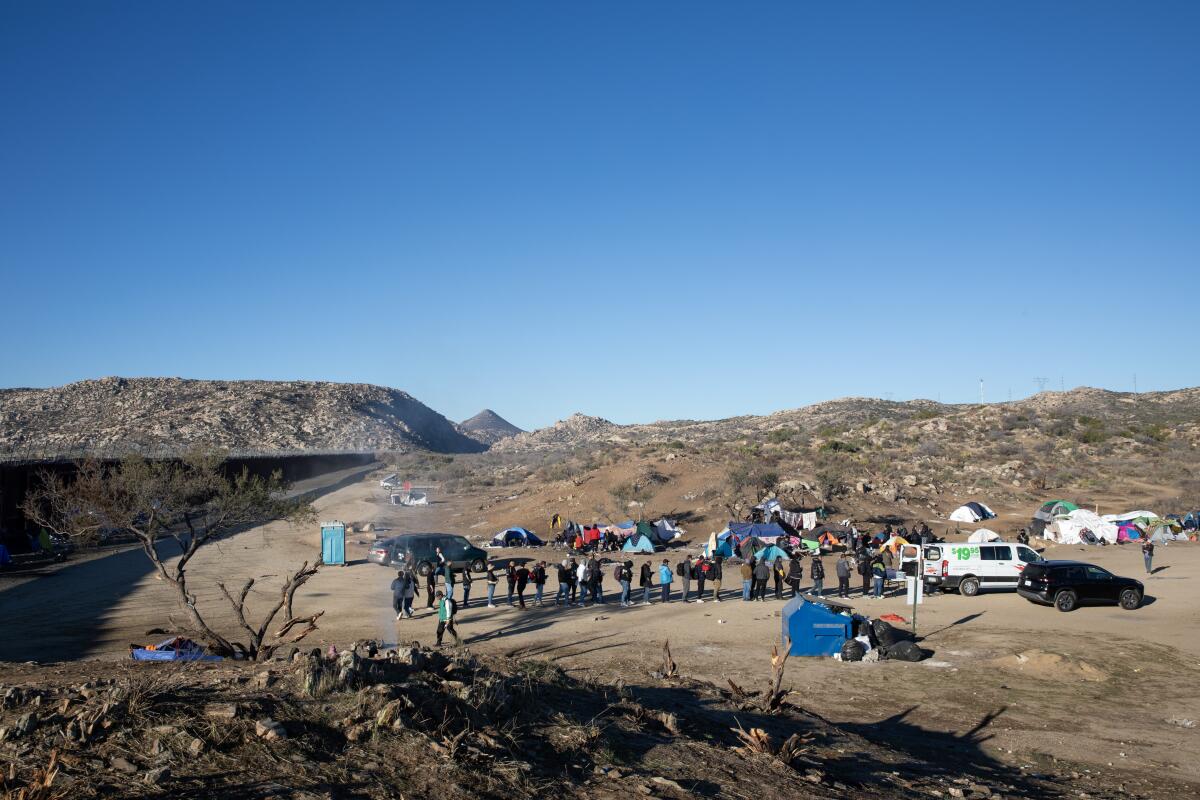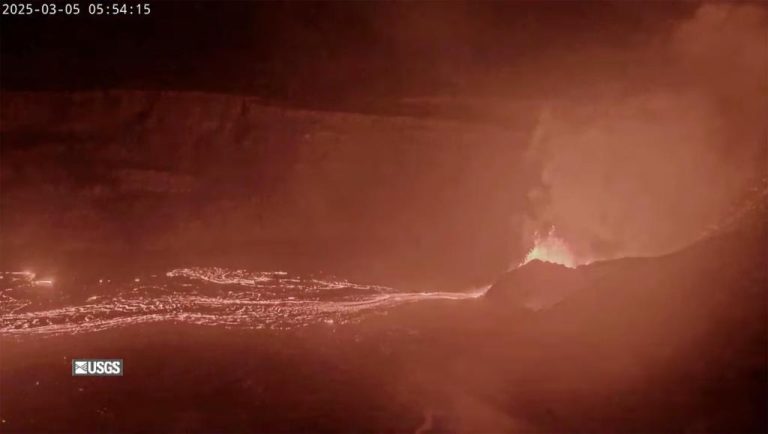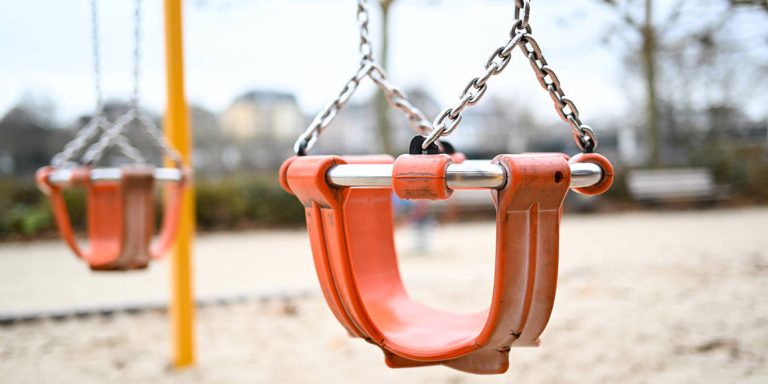
Immigrant rights groups say that the Border Patrol is continuing to violate federal standards by holding migrants in open-air detention sites after they cross the U.S.-Mexico border — a situation they say has recently worsened at sites in the East County desert, according to a complaint filed with a watchdog arm of Homeland Security this week.
For months, thousands of migrants who have crossed the border, many of them seeking asylum, have been directed by Border Patrol to remain in open-air holding sites before being processed by the federal agency, according to the complaint and interviews with several migrants. The migrants wait hours or sometimes a few days at the camps before being picked up and taken to a processing facility.
The complaint, filed to the U.S. Department of Homeland Security Office for Civil Rights and Civil Liberties, alleges that Border Patrol agents are forcing migrants to wait at the camps without providing adequate food, water, shelter, restrooms or medical care. The groups say this is a violation of Customs and Border Protection’s standards on caring for detained individuals, as well as a violation of migrants’ rights under the International Covenant on Civil and Political Rights.
It’s the second complaint filed against the agency for conditions at the sites, though the first complaint in May focused on the camps located between layers of border wall near San Ysidro. This new complaint — filed by seven immigrant rights groups including Al Otro Lado, Southern Border Communities Coalition and American Friends Services Committee — expands to also include open-air sites in Jacumba Hot Springs, which has seen a significant increase in migrants since September.

About 80 migrants wait in line for food and tea that’s being provided by volunteers. Many people were from China, Colombia, Brazil, Peru and other countries.
(Ana Ramirez/The San Diego Union-Tribune)
“By allowing big numbers of migrants to be held in these conditions in the Jacumba desert, it creates a whole different level of challenges that actually puts the migrants’ lives in more danger,” said Lilian Serrano, the director of the Southern Border Communities Coalition, noting concerns including the extreme desert weather and the difficulty reaching migrants in more remote areas.
Border Patrol did not respond to a request to comment on the complaint by the time of publication. The agency has maintained that agents are only there to monitor migrants at the open-air sites, not detain them, however migrants are not permitted to leave the area.
The immigrant rights groups say that they filed the second complaint because their concerns were not adequately addressed with the first one.
In the days and weeks following the first complaint, Serrano said that aid groups noticed fewer migrants being held at the San Ysidro sites, likely due to increased Border Patrol processing.
In late September, the Office for Civil Rights and Civil Liberties responded to the complaint and said in a letter that it “raised concerns about conditions at the site with CBP and suggested that CBP have humanitarian assistance plans in place to ensure these conditions do not recur.”
However, in the new complaint, the aid groups say that the situation has not been resolved, noting now that the conditions in Jacumba Hot Springs are “just as, if not more, deplorable” than the conditions at the San Ysidro sites.

A man from China comforts his 9-month-old son as they wait to be processed by Border Patrol in Jacumba Hot Springs. He said he and his family are trying to go to New York or Los Angeles where he can find work to support his family. He also said he left because “China is not safe.” He said he worried about staying the night in the area because they only had one emergency blanket.
(Ana Ramirez/The San Diego Union-Tribune)
In October, a 29-year-old Guinean woman died at one of the camps in San Ysidro. Fewer migrants are waiting at the camps in the area now, with the majority at the four camps in Jacumba Hot Springs.
On any given day, the population ranges from less than 100 migrants to more than 750 at the desert sites, according to the complaint. Aid groups have reported seeing dozens of children and pregnant women during their time providing aid there, which has included offering food, water, clothing, translation assistance and first aid.
The groups have also reported a lack of shelter — the camps are highly exposed to the elements — and are increasingly concerned about how winter weather could impact the situation.
According to the complaint, several volunteers have already seen migrants suffering from hyperthermia and hypothermia.
“The possibility of temperature changes could exacerbate some of the problems we have been seeing,” said Pedro Rios, the director of American Friends Services Committee, noting that it was about 48 degrees in the morning at one of the camps in San Ysidro on Thursday. “It’s really cold when children are having to spend the night out here, and I can imagine in Jacumba it’s colder than that. The degree of urgency is increasing as we’re getting closer to colder days in the winter season.”
Last Friday morning, Coni Moreira and her family from Ecuador entered one of the camps located near Interstate 8. By 8 p.m., Moreira said she was picked up by Border Patrol to be processed. Her son’s uncle, however, had to stay for two more days. When he eventually left, he “came out extremely sick,” Moreira told the Union-Tribune by text on Wednesday.
Moreira made it to her final destination of Tampa, Fla., earlier this week.

Family and friends from Ecuador walk to an open-air detention area off of Interstate 8 outside of Jacumba Hot Springs. The group had been walking five to six hours before a Border Patrol agent found them and led them to the area where they will wait to be processed. The family said they left home because of the political situation and feared for their safety.
(Ana Ramirez/The San Diego Union-Tribune)
Aid groups have been sounding the alarm about the open-air sites with federal and county officials for months.
Last week, nearly a dozen aid groups wrote a letter to the county Board of Supervisors recommending that they designate funding for humanitarian assistance to specifically serve those areas.
The board allocated $3 million for migrant services being offered at a temporary migrant welcome center in central San Diego, paying for basic needs items like food, Wi-Fi and transportation. These services are offered to migrants after they have been processed by Border Patrol and dropped off in San Diego County.
The county says it is unable to provide a portion of the funding to the camps, citing language in the county’s contract with SBCS, the nonprofit that manages the funding.
“The money allocated can only be used to aid folks who have been through the asylum process with CBP,” Michael Workman, the county spokesperson, said in an email.
Serrano said that since filing the complaint on Monday, she and other groups have noticed fewer migrants being held at the desert sites, similar to what happened after they filed the first complaint in May.
But beyond clearing the sites temporarily, Serrano said the groups are hoping that this complaint leads to a review of the entire practice of the open-air sites.
“The whole reason we are filing is because while we were able to address the immediate needs, it seems to us that the real root of the problem — the practice of holding people in these conditions — wasn’t addressed. If we had addressed that, these camps wouldn’t exist now.”







